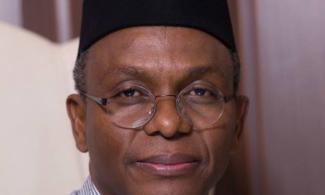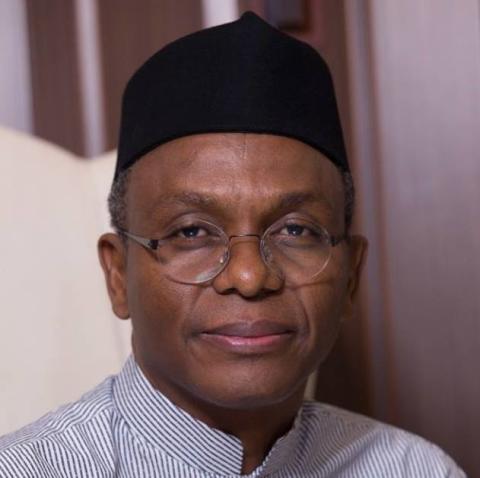
Governor Rauf Aregbesola of Osun faces pressure from the Christian Association of Nigeria who begged churches to donate food to Osun State workers after seven months of unpaid salaries. Even more disconcerting, the People's Democratic Party (PDP) Chapter of the State have implored the Governor to sell the State-owned helicopter as a means to raise funds.

Earlier this week the Kaduna State Governor, Nasir El-Rufai, publicized his plan to completely restructure the traditional way the State’s Ministries are organized.He plans to reduce the number of Ministries in the State from 19 to 13, in order to cut the elevated cost of governance and reduce the number of aides that work under Commissioners.
The strategy that El-Rufai has adopted will entail moving different Ministries to the Governor's Office or Deputy Governor's office as separate departments.
The hope is that all sections that are part of the Information Ministry will not be centralized under one establishment. Moreover, in El- Rufai's plan each Ministry will have its own Public Relations unit that is adjunct to the Office of the Chief Executive.
After Governor El-Rufai's plan became public last week, more States announced they intend to structure their governments in the same manner. The resolve of El-Rufai to stabilize the finances of Kaduna State has inspired other lawmakers.
At the inauguration of the 8th Assembly in Ibadan, Governor Abiola Ajimobi of Oyo State announced this Tuesday that he will also downsize his State's ministries from 23 to 13.
Governor Ajimobi's reasoning is that this will reduce the excessive costs of governance, help the restructuring of the Ministries, Departments, and Agencies (MDAs) to reach their optimal performance, and potentially improve the revenue generated by the State.
Amid serious crisis concerning the unpaid salaries of a countless employees which has resulted in strike, the lost pensions, and grim financial decay Osun State has great capacity to reduce their Ministries.
Governor Rauf Aregbesola of Osun faces pressure from the Christian Association of Nigeria who begged churches to donate food to Osun State workers after seven months of unpaid salaries. Even more disconcerting, the People's Democratic Party (PDP) Chapter of the State have implored the Governor to sell the State-owned helicopter as a means to raise funds.
PDP has blamed Governor Aregbesola for the financial crisis of the State. They claim the helicopter, which was meant to serve as surveillance, only serves the travel needs of Aregbesola and his family.
A Statement by Diran Odeyemi, PDP's Director of Media and Strategy, claims Osun State is in crisis because public funds were "recklessly expended on irrelevant, but huge projects without adequate projection of the funds available to the State."
The PDP Party also suspects that by sponsoring the bribery of Ekiti lawmakers, Aregbesola used the State's money to fund part of the impeachment plots for Governor Ayo Fayose of Ekiti State.
Governor Aregbesola has denied these claims, but has not produced an execution plan that alleviates the financial burdens weighing on Osun.
As the luminary behind the Ministerial reduction movement. El-Rufai said he has slashed his salary and the deputy governors by 50% "until the fiscal situation of the State improves." These measures are unprecedented approaches to reduce the cost of governance in the State. In a visit to the State House of Assembly on Wednesday, Governor El-Rufai made pleas to the lawmakers of the state to also cut their own salaries so that Kaduna’s development could thrive.
"We appeal to all political office holders to embrace this example and attitude of sacrifice. Once done with paying salaries, allowances, overheads and pensions, the State is unable to do much by way of building infrastructure or providing services. The stark fact is that Kaduna State spends 80% of its total revenue on its public servants and political office holders, El-Rufai said.
"Can we as elected leaders deliver any significant service or implement progressive actions or attain desirable outcome for the majority of our people if we devote only 20% of our available resources to their needs? Would we not be undermining the very rationale of democracy, if, after being elected by majority vote, we uphold a system that solely serves the pleasures of a servant-minority?" the Governor said.
El-Rufai’s words are reverberating throughout NIgeria. "It is our duty to overcome or at least navigate the impediments of low revenue and unsustainable recurrent expenditures."
Many Nigerian States face huge debt, decreasing revenues, and critical financial crisis. There must be cooperation between the Governor and his State as well as self-discipline which leads to quality financial management.